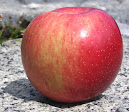
|
| Nobody is home at Nagog Hill Orchard yesterday. |
I took refuge from a passing shower in the shed where Nagog Hill Orchard once sold its apples.
Nagog was an early source for me. I got a perfect apple there once.
The orchard is large by New England standards, with hundreds of trees. It's a shame to see it lying fallow for so long.
The farm changed hands, and it's been at least three years since the trees there had been pruned,

|
but someone is still cutting the grass.

So sad!
ReplyDeleteThe property belongs to the Town of Littleton. The people who had been operating the orchard didn't renew the 30-year lease. The Town of Littleton has offered the property for lease or sale. According to the Town, the apple trees are no longer commercially viable. (Wonder why they think that?) The land -- or at least some of it -- must be used for agriculture. It can't be used for housing.
ReplyDeleteOh no!
DeleteI also do not understand the "not commercially viable" idea. Those trees need work but could bear again.
If that is what the town is telling people, no wonder no one wants to take it on.
I hope that assessment is not based on some notion that only Honeycrisp or Gala etc. could be "commercially viable."
Really a shame for one of the largest orchards in the area.
Sad indeed. The city may have assumed that the non-renewal of the lease was admission of commercial non-viability, or perhaps the lessees themselves told the city that it wasn't worth it anymore in terms of profitability.
DeleteI have often told people about your blog and speculated as to the rather rare situation that you encounter there in New England: You can actually buy heirloom apples without growing them yourself! In so much of the world you have to really, really work hard at finding these varieties for sale. It could well be that the market for interesting apples is just not that big, and the costs of maintaining diverse orchards just doesn't get recaptured in sales --mostly because people don't know what they are missing. When I tell people what I am trying to grow, people react with surprise that (1) there are apple varieties beyond the 6 that show up in grocery stores and (2) there are whole worlds of apple flavors that are unknown to those who buy those 6 varieties. That's actually true of almost all produce; people have no idea of the number of varieties out there. They think there are 3 varieties of peaches: yellow, white, and donut. When I was growing up, they thought there were 2: cling and freestone. And strawberries? Organic and non-organic.
Adam and Mike, If you take some time to read instead of speculation then the you will find that the Ad-hoc Working group hired local university agricultural experts to assess the health of fruit trees and disease assessment. Can find reference in documentation on following link
ReplyDeletehttps://www.littletonma.org/933/Nagog-Hill-Orchard-Ad-Hoc-Working-Group
Thank you, @Anonymous. I regret to say I cannot find that using the link you've provided, though I appreciate the reference to the Town's web page for the working group that was involved in this..
DeleteUnfortunately, since you posted anonymously, Blogger can't tell you that your comment received this reply. But if you or other knowledgable LIttletonian ever comes this way, perhaps you could share a link to the report.